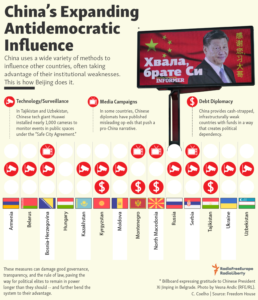
RFE/RL
The foreign policy pillars of a new U.S. administration would likely be driven by three Ds: Domestic, Deterrence and Democracy, argues Anne-Marie Slaughter, CEO of the New America think-tank and former board member of the National Endowment for Democracy (NED). But it would still embrace great power competition, focusing on China as its main rival, and substitute a values-based foreign policy for a power-based approach, she writes for The Financial Times:
Michèle Flournoy, a leading candidate for defence secretary in a Biden administration, has laid out the steps necessary to “reestablish credible deterrence of China” by changing Beijing’s cost-benefit calculus when it considers acts of aggression. She believes particularly in the need for the Pentagon to invest in new technologies that protect US communications and battle management networks against China’s efforts to degrade them…….. Commentator James Traub points out that phrases like “the free world” come naturally to Mr Biden, however old-fashioned they may seem to the progressive left. In this formulation, he writes, Mr Biden “would refound ‘the west’ for a new age of problems without borders”.
Nothing is as important to competing effectively with China as what the United States does at home, revitalizing its economic fundamentals, technological edge, and democratic system, argues Julian Gerwitz, Senior Fellow for China Studies at the Council on Foreign Relations, a Fellow in the Columbia-Harvard China and the World Program, and Lecturer in History at Columbia University.
All these initiatives would be important even in the absence of competition with China, but the rivalry with Beijing adds to their urgency, he writes for Foreign Affairs:

21st Forum 2000 Conference
Policymakers must get the COVID-19 crisis under control, implement economic policies that benefit all Americans, welcome immigrants who enrich U.S. society, pursue racial justice to show the world that U.S. democracy can remain a beacon of freedom and equality, make smart investments in U.S. defense capabilities, and scale up federal funding for research and development. This ambitious agenda for national renewal and resilience would profoundly shake the foundations of the CCP’s strategy. U.S. leaders should also not shy away from publicly pointing out authoritarian China’s many weaknesses, including the country’s aging population, ecological crises, numerous border disputes, and declining international popularity.
Not all risks are equally significant, however, and the United States and its democratic allies are open societies that still stand to gain from economic, scientific, and people-to-people exchanges with countries around the world, including China, even as they do more to guard against coercion and espionage from foreign rivals, Gerwitz adds.







